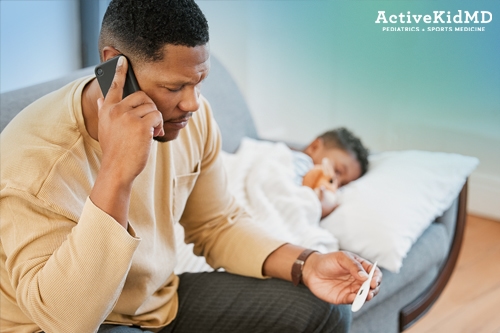You hear your baby or toddler coughing from the other room. It might be a new cough that wakes them up in the middle of the night, or a cough that has lasted for weeks. At times, it may seem that your young child is always sick. You feel somewhat helpless – you don’t want to miss something serious, and you don’t know exactly what to do to help your sick young child.
As pediatricians, we hear stories like this all the time, and often the main questions with them are something along the lines of “how can we tell when my child needs to see the doctor” and “do we have to pack things up and head to the emergency room/urgent care, or can we wait until regular office hours?”
Don’t just show up and guess when your younger child is sick. Show up with a plan to help your sick child. Working with ActiveKidMD can help you develop that plan.
Now, no blog post or article can give exact guidance in every situation. Therefore, it is best to call ActiveKidMD (a human voice answers the phones 24 hours a day) or your child’s doctor for individual assistance.
Let’s give some insight into how pediatricians think when dealing with coughs and colds in younger children, and how this might help you with your sick young child.
Is the child playing, eating and sleeping like they usually do?
- A child who is playing, eating, and sleeping without too much difficulty is less of a concern. Therefore, there is no immediate need to bring the child in to see the doctor.
- The child who is not as interested in playing, who won’t respond as well to toys or family members, or who won’t take food or drink fluids poses a higher level of concern.
How can you measure eating and drinking enough? Usual frequency of wet diapers and producing tears when crying are good measures. Sick kids don’t necessarily have to eat, but they do need to keep up on fluids. - Consider how your child is sleeping. The child who isn’t sleeping (cough makes it hard to fall asleep or leads to increased awakening), or on the other hand is sleeping too much (hard to awaken, won’t awake for feeds) should be seen by their physician.
Walking into an exam room, we can usually get a quick idea of how a sick child is doing. The child checking out the room or tearing up the table paper tends to make us less worried, while the child sitting in an adult’s lap and not making eye contact is a bigger worry.
 RELATED TOPIC: The situations described above both lend themselves as a great opportunity for telemedicine, especially since it seems that most kids get worse at night when offices are closed. No, we can’t listen to lungs or check ears through an on-line visit, but we can look at overall activity level and get an idea of how hard a child is working to breathe (see below). Click here to learn more about how to Make a telemedicine visit during office hours or after hours (even nights or weekends) as we might be able to offer reassurance to parents, give specific advice, and possibly reduce need for emergency and urgent care visits.
RELATED TOPIC: The situations described above both lend themselves as a great opportunity for telemedicine, especially since it seems that most kids get worse at night when offices are closed. No, we can’t listen to lungs or check ears through an on-line visit, but we can look at overall activity level and get an idea of how hard a child is working to breathe (see below). Click here to learn more about how to Make a telemedicine visit during office hours or after hours (even nights or weekends) as we might be able to offer reassurance to parents, give specific advice, and possibly reduce need for emergency and urgent care visits.
Is your child working harder to breathe?
This is a visual, and if the answer to any of these is “yes,” then an immediate call followed by a telemedicine (and in-person evaluation) can be helpful. A child who has 2 or more should probably be seen immediately – likely in an emergency room or urgent care.
- If your child is breathing faster than usual, this can be working harder to breathe.
- Look at your child’s nostrils. As a pediatrician, I get more concerned when they are moving in and out in an effort to bring in more air (pediatricians call this nasal flaring).
- Look at your child’s chest for signs of extra work (pediatricians call these retractions). These signs include:
• Sucking in of the space just below the neck and above the breastbone
• Extra movement or sucking in/out of the muscles between the ribs
• Extra movement of the abdominal (stomach) muscles below the ribs
How does the cough sound?
This is more of an auditory thing. Again, telemedicine and office visits can help in this situation. We’ve even had phone calls that have enabled us help families with sick young children.
- A cough with barking (like a seal) and a harsh “whoop” with breathing in (pediatricians call this stridor) can be seen with croup. Croup is narrowing of the upper airway and especially the stridor tends to get worse at night. Stridor tends to show up at night and go away during daytime hours. Nighttime stridor is one level of worry but any stridor in the daytime is even more of a concern.
- A cough with big time congestion in the nose (sounds like a truck coming down the road) could represent infection with Respiratory Syncytial Virus (RSV). In a sick young child, RSV can move quickly and cause a child to not drink, feed, or sleep due to having to work harder to breathe.
- If you can hear rattling in the chest or even a “wheezing” sound, your sick child’s cough could be due to smaller airway narrowing (pediatricians call this bronchospasm or asthma).
With any cough/congestion cold, and especially the coughs described above, check for those signs of increased work of breathing and if there are any concerns, make an immediate call and schedule an office or telemedicine visit.
 Does your sick young child have an increased temperature?
Does your sick young child have an increased temperature?
An increased temperature could be part of your child’s immune system helping to fight an infection. Pediatricians tend to define a fever as an increased temperature over 100.3 degrees Fahrenheit. Immediately call the office or your child’s doctor if your young sick child is 3 months of age or younger and has a temperature of 100.3 or higher. For young sick children older than 3 months of age, look again at feeding, drinking, playing, sleeping, and work of breathing. If you have any concerns, call the office (or your child’s doctor) for an in-office or telemedicine appointment.
MORE INFORMATION: Click here to Learn what causes fevers and how to treat them
The pediatricians and staff at ActiveKidMD are available to help answer any question regarding coughs, colds, and other illnesses or injuries. Team with us to have a plan to know what do with a sick young child.


